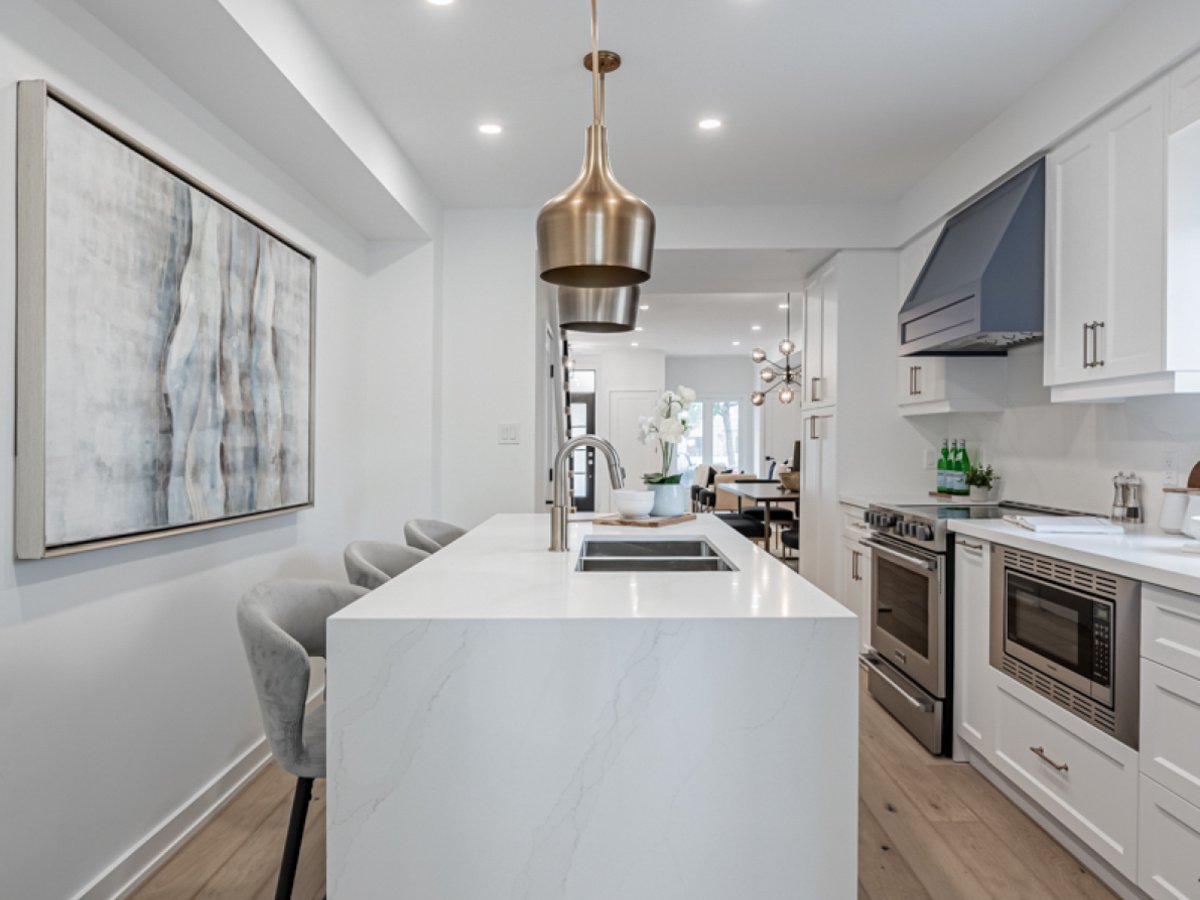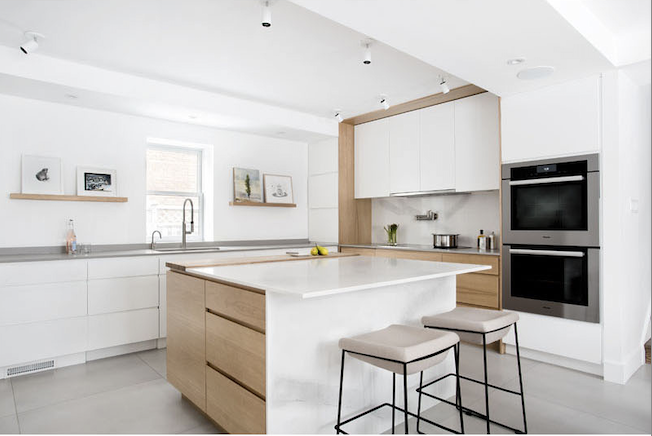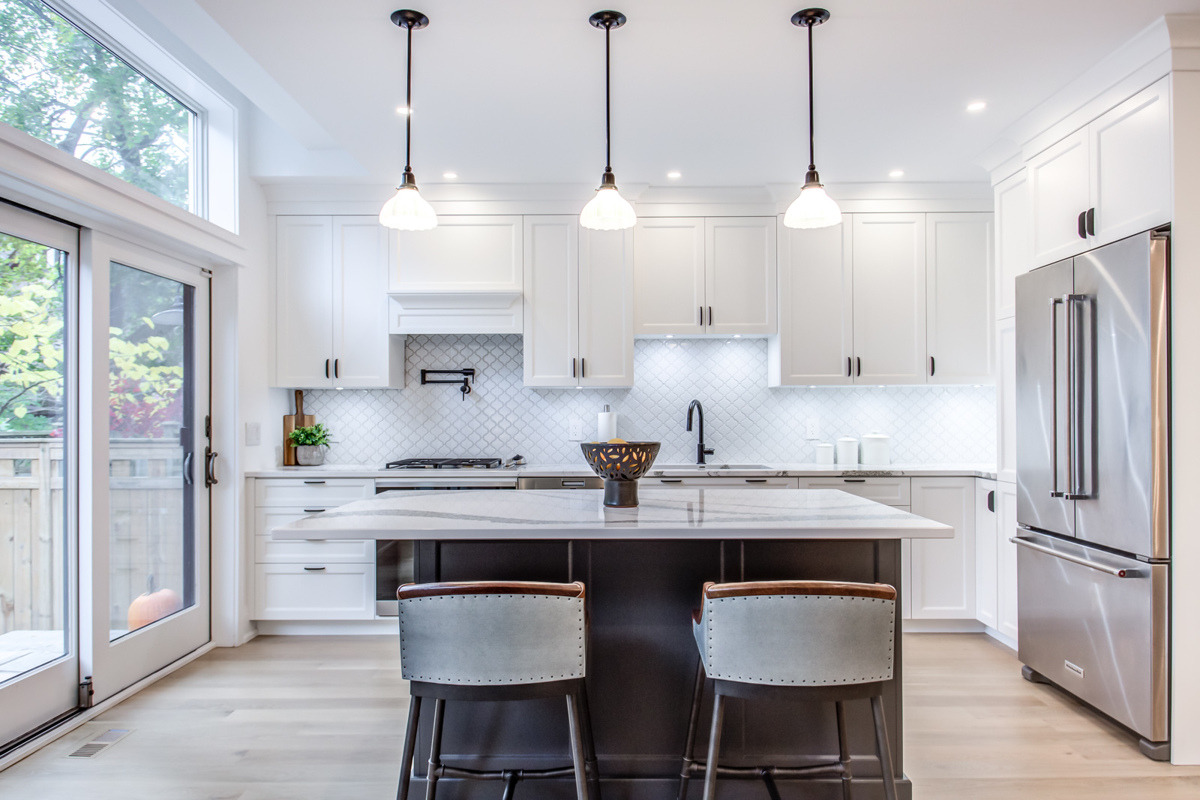How to Choose a Kitchen Renovation Contractor
9 Things You Must Do Before You Choose a Kitchen Renovation Contractor Choosing the right contractor for your kitchen renovation is crucial to...
6 min read
Quacy Barry Jul 28, 2024 11:35:49 AM

Remodelling a kitchen can be one of the most exciting and transformative projects you undertake in your home. The kitchen is often considered the heart of the house, and updating it can bring new life to your living space. However, it's crucial to understand the costs involved to ensure you can plan and budget effectively. This guide will explore the various factors influencing kitchen remodel costs, provide a detailed breakdown of expenses, and offer tips on managing your budget. By the end of this article, you'll clearly understand what to expect and how to make the most of your kitchen renovation.
Table of Contents
Scope of the Remodel: The extent of your renovation will significantly impact the overall cost. A minor remodel might involve updating cabinet fronts, countertops, and fixtures, while a major remodel could include:
Quality of Materials and Finishes: The quality and type of materials you choose for your kitchen remodel will be crucial in determining costs. High-end materials like granite or quartz countertops, custom cabinetry, and professional-grade appliances will be more expensive than laminate countertops, stock cabinets, and standard appliances.
Labour Costs: Labor is another significant factor. Hiring skilled professionals such as contractors, electricians, plumbers, and carpenters can add up quickly. Labour costs can vary widely based on the complexity of the project and the workers' experience level.
Geographic Location: Your home's location can influence the cost of your kitchen remodel. Remodelling costs tend to be higher in urban areas and regions with a high cost of living. Conversely, costs may be lower in rural areas.
Permits and Regulations: Depending on the scope of your remodel, you may need to obtain permits and comply with local building codes. Permit costs can vary, and failing to secure necessary permits can result in fines and delays.
Cabinetry and Storage: Cabinets are often the most significant expense in a kitchen remodel, accounting for 20-40% of the total budget. Custom cabinets are the most expensive, while stock or semi-custom cabinets offer more budget-friendly options.
Countertops and Backsplashes: Depending on the material, countertop costs can range from $20 to $200 per square foot. Granite, quartz, and marble are on the higher end, while laminate and tile are more affordable. Backsplashes can add another $10 to $50 per square foot.
Appliances and Fixtures: High-end appliances can cost thousands of dollars each, while budget models are available for a few hundred dollars. Fixtures like sinks, faucets, and lighting can also vary widely in price based on quality and design.
Flooring and Lighting: Flooring materials like tile, hardwood, and luxury vinyl plank can range from $3 to $15 per square foot. Lighting costs depend on the type and number of fixtures, with recessed lighting and pendant lights being popular choices.
Plumbing and Electrical Work: Upgrading plumbing and electrical systems can increase the cost, especially if significant changes are needed. Depending on the complexity of the work, expect to pay $1,000 to $5,000 or more for these services.
Minor Remodels: A minor remodel might include new cabinet doors, countertops, and fixtures, costing an average of $10,000 to $30,000. These projects typically offer a high return on investment (ROI) as they enhance the kitchen's appearance without extensive structural changes.
Mid-Range Remodels: Mid-range remodels involve more extensive updates, such as new cabinetry, countertops, and appliances, and cost from $20,000 to $50,000. These projects often include some layout changes and new flooring.
Major Remodels: Major remodels can cost $50,000 to $100,000 and include complete overhauls with custom cabinetry, high-end appliances, new layouts, and luxury finishes. These projects offer a lower ROI but significantly enhance the kitchen's functionality and aesthetics.
.png?width=1878&height=1076&name=output%20(4).png)
Setting a Realistic Budget: Determine how much you can afford to spend on your kitchen remodel and stick to it. Consider financing options if necessary, but avoid overextending yourself.
Prioritizing Key Features: Identify the most critical elements of your remodel and allocate your budget accordingly. Focus on areas that will provide the most significant impact and value, such as cabinets and countertops.
Avoiding Common Budget Pitfalls: Plan for unexpected expenses by setting aside 10-20% of your total budget for a contingency fund. Be realistic about your needs and avoid unnecessary upgrades that can increase costs.
DIY vs. Hiring Professionals: Consider handling some tasks yourself to save on labour costs. However, be honest about your skills and leave complex jobs like electrical and plumbing work to the professionals.
Choosing Cost-Effective Materials: Opt for budget-friendly materials with good quality and aesthetics. For example, some should consider butcher block countertops and laminate countertops instead of granite or quartz.
Reusing and Repurposing Existing Elements: If your cabinets, appliances, and fixtures are still in good condition, you can save money by reusing them. Refacing or refinishing cabinets can give them a new look without the cost of replacement.
Unexpected Structural Issues: Be prepared for potential structural issues during the remodel, such as outdated wiring, plumbing problems, or mould. These issues can add to the overall cost.
Delivery and Installation Fees: These factors factor into the cost of delivering and installing new materials and appliances. These fees can increase, especially for large items like cabinets and countertops.
Temporary Living Arrangements: If your remodel is extensive, you may need to find temporary living arrangements, which can add to the overall cost. Consider the impact of being without a functional kitchen for an extended period.
Case Study 1: Minor Remodel in a Suburban Home: The Johnson family updated their kitchen with new cabinet fronts, laminate countertops, and stainless steel appliances. The total cost was $35,000, and they saw a significant improvement in functionality and appearance.
Case Study 2: Mid-Range Remodel in an Urban Condo: Megan, a homeowner in a downtown condo, opted for a mid-range remodel with new cabinetry, quartz countertops, and modern appliances. The project cost $55,000, and she was thrilled with the contemporary look and enhanced storage space.
Case Study 3: Major Remodel in a Luxury Home: The Smiths undertook a major kitchen remodel in their luxury home, including custom cabinetry, high-end appliances, and a reconfigured layout. The project cost $80,000, and they were delighted with the transformation, though the ROI was lower than expected.
Remodelling a kitchen is a significant investment that can significantly enhance your home's value and functionality. By understanding the costs involved, setting a realistic budget, and making informed decisions about materials and features, you can ensure a successful remodel that meets your needs and maximizes your return on investment. Whether you opt for a minor update or a major overhaul, careful planning and budgeting are crucial to achieving the kitchen of your dreams.
Distribute your total budget across the main categories of your remodel. Here’s a suggested allocation based on typical kitchen remodels:
Estimate the costs for each category by researching average prices and getting quotes from contractors. Here’s an example based on a $50,000 budget:
| Category | Percentage | Amount ($) | Notes |
|---|---|---|---|
| Cabinetry and Storage | 25% | $12,500 | Custom vs. stock cabinets |
| Installation | 17% | $8,500 | Labor costs |
| Appliances | 14% | $7,000 | Energy-efficient, high-end vs. budget |
| Countertops | 12% | $6,000 | Granite, quartz vs. laminate |
| Flooring | 10% | $5,000 | Tile, hardwood vs. vinyl |
| Lighting | 8% | $4,000 | Recessed lights, pendants |
| Plumbing | 7% | $3,500 | Reconfiguration and new fixtures |
| Backsplash | 5% | $2,500 | Tile, waterproofed wood, metal |
| Fixtures | 2% | $1,000 | Faucets, knobs, pulls |
Identify the most important elements of your remodel and allocate funds accordingly. Focus on areas that will provide the most significant impact and value, such as cabinets and countertops.
Set aside 10-20% of your total budget as a contingency fund to cover unexpected expenses, such as structural issues or last-minute changes.
Keep detailed records of all expenses throughout the project. Use a spreadsheet or budgeting app to track spending and ensure you stay within your budget.
Regularly review your budget and adjust as necessary. If you overspend in one category, look for ways to save in another.
| Category | Budget Allocation (%) | Budget Amount ($) | Actual Amount Spent ($) | Notes |
|---|---|---|---|---|
| Cabinetry and Storage | 25% | $12,500 | $12,000 | Custom cabinets |
| Installation | 17% | $8,500 | $9,000 | Labor costs |
| Appliances | 14% | $7,000 | $6,800 | Energy-efficient appliances |
| Countertops | 12% | $6,000 | $5,500 | Quartz countertops |
| Flooring | 10% | $5,000 | $5,200 | Hardwood flooring |
| Lighting | 8% | $4,000 | $3,800 | Recessed lights, pendants |
| Plumbing | 7% | $3,500 | $3,200 | Reconfiguration and new fixtures |
| Backsplash | 5% | $2,500 | $2,600 | Tile backsplash |
| Fixtures | 2% | $1,000 | $1,000 | Faucets, knobs, pulls |
| Contingency Fund | 10% | $5,000 | $5,700 | Structural issues discovered |
| Total | 100% | $50,000 | $50,800 | Slightly over budget due to contingencies |
Creating a detailed budget plan for your kitchen remodel helps ensure that you stay on track financially and maximize your return on investment. By allocating funds wisely, prioritizing key features, and tracking your spending, you can achieve the kitchen of your dreams without breaking the bank.

9 Things You Must Do Before You Choose a Kitchen Renovation Contractor Choosing the right contractor for your kitchen renovation is crucial to...

1 min read
If you’re considering kitchen renovations, it’s exciting but also potentially overwhelming. There are dozens of contractors in Toronto and the...
.png)
{% video_player "embed_player" overrideable=False, type='hsvideo2', hide_playlist=True, viral_sharing=False, embed_button=False, autoplay=True,...